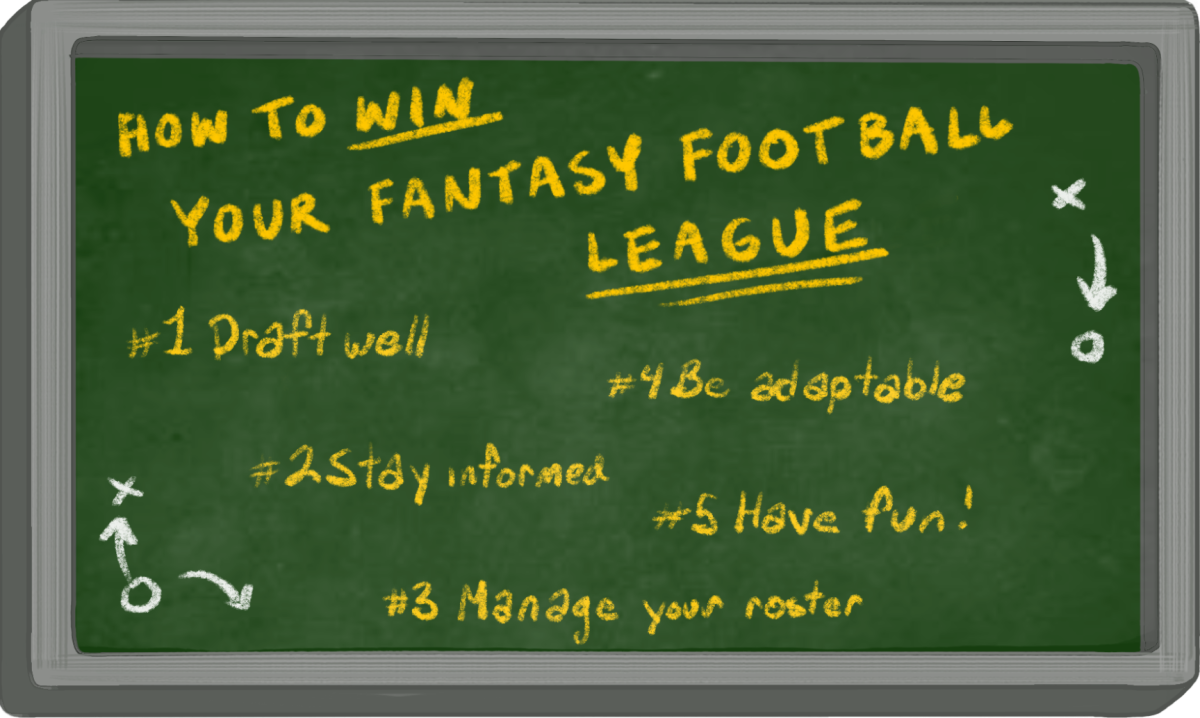 The NFL season is underway, meaning fantasy football is in full swing. Introduced at an Oakland hotel in the 1960s by Bill Winkinbach—at the time co-owner of the Oakland Raiders football team—the game has evolved from its humble beginnings and expanded across the nation. Now boasting 29.2 million players, fantasy football is a staple of the NFL season, enrapturing casual and hardcore fans alike.
The NFL season is underway, meaning fantasy football is in full swing. Introduced at an Oakland hotel in the 1960s by Bill Winkinbach—at the time co-owner of the Oakland Raiders football team—the game has evolved from its humble beginnings and expanded across the nation. Now boasting 29.2 million players, fantasy football is a staple of the NFL season, enrapturing casual and hardcore fans alike.
For those who might be unaware, the game’s general premise is as follows: after making a league with your friends, each league member drafts real NFL players to their team and receives points depending on their players’ stats each game. After facing off against other teams each week, the person with the best record at the end of the NFL season is crowned champion. Conversely, the person with the team that finished in last place usually suffers a cruel punishment—all in good fun, of course. Overall, the game is simple enough to play and adds a level of engagement for football fans nationwide.
But that’s the thing—fantasy football has typically been portrayed as a hardcore fan’s pathway to investing even more time into the game they love, and as someone who never really watched football, when my friends invited me to join their league this year, I had questions about whether I could enjoy it. I was far from a hardcore NFL fan, and I couldn’t picture myself taking time to watch the games or track my player’s activity. In the end, I relented. After all, it would be the perfect chance to answer the question: should a non-NFL fan try out fantasy football?
To answer that question, I took up my friend’s offer and joined his league. A part of me had always wanted to try out the game. Throughout my first two years in high school, I had known of fantasy football, but because of a lack of knowledge of the sport, I simply never gave it a go. I often heard classmates discussing the state of their teams or the results of a matchup, and it genuinely seemed interesting. I was excited to draft my team, but because it was my first time playing, I had absolutely no clue what I was doing. I tried listening to general advice, but I didn’t know any players. During the draft, the numbers and rankings were my best friend, and I definitely picked some players who looked good on paper but ended up as busts. So far this season, my team’s record is a rough 4-6, and the future isn’t looking too bright. I’ve made some questionable trades, and my opponents always seem to somehow pull the win from right under me. All that being said, my experience with fantasy football has been nothing but positive. Evidently, the reason for this doesn’t lie in my team’s success, but in the amusing conversations with friends and the bonding aspect of the game.
Elaborating more on this is junior Beck Hansen, who agrees that the social aspect is really the core of the game.
”Well, mostly it was just being able to hang out with friends and consistently have something to talk about. It’s something that brought us together,” he said, when asked about why he started playing fantasy football. Hansen also described the activities outside the game that boosted his friendships with others in the league. “You can give it some stakes though, too. I think last year, we did [the] ice bucket challenge in zero-degree weather; it was a lot of fun.”
Fellow junior Danny O’Connor touched on similar points.
“If you bring someone into the fantasy football league who you don’t talk to as much, now you have something to talk about; they are more integrated into your group of friends.”
O’Conner first played fantasy football in 2018 when some friends invited him to join their league, and after a five-year absence, O’Connor returned to the game.
“This year, again, we did another league, my group of friends, because it’s a fun thing to do. And I kind of missed it, to be honest,” explained O’Connor. “So I think you’re all going through that league together, and all kinds of things can happen. It’s nice, friendly competition that spurs on more conversation.”
Personally, I have definitely noticed this growth of friendship. I’ve become closer with people I didn’t necessarily know as well before, simply because we all share the same experiences through the same game. Fantasy football is such an easy topic to bring up; everyone involved has something to contribute, and everyone can be included.
The question remains though: should a non-NFL fan try out fantasy football? Well, the verdict is yes! Though I came in with no previous knowledge of the game, in the end, I experienced firsthand that the experience truly is about the people you play it with. It might sound cheesy, but ask anyone who enjoys fantasy football, and they’ll repeat the sentiment. As Hansen and O’Conner voiced earlier, the game brings people together in all types of ways. Fantasy football is totally about football, don’t get me wrong, but it goes far beyond that as well. As a whole, it’s a fun game that anyone and everyone should try.
So, if you’re feeling inspired and want to play fantasy football for the first time next year, what are some things you should do? Well, O’Connor suggested watching games that seem interesting to you, as well as the games that your players are playing in.
On top of that, Hansen recommended, “You may want to have a little bit of knowledge about the game of football… maybe do a tiny bit of research about certain players.”
However, these things are totally optional, and not doing them doesn’t take away from the experience. Fantasy football offers a lot more than just football, and everyone should give the game a go: I ’m definitely glad that I did.
’m definitely glad that I did.





